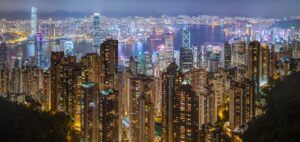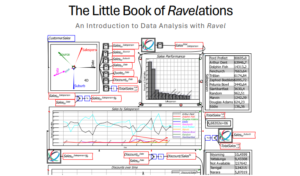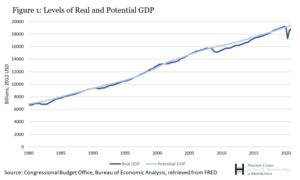If you found this post via search, it probably makes sense to start with the first post in this series. The link to the full series is above.
In this series of posts, I examine seven specific nations that created economic value which transformed them from fairly poor countries to fairly rich countries.
This post focuses on Hong Kong.
Table of Contents
Background information
Hong Kong has never been an independent nation.
It became part of China about 2200 years ago and was ceded to the British in 1842 after Britain won the first opium war.
Side note: The Opium Wars were started by Britain after China banned opium. Some British people had been making good money selling opium to people in China, and they wanted that to continue.
Per the Second Convention of Peking, a treaty signed in 1898, Britain leased Hong Kong for 99 years, which I’m sure at the time seemed like “forever”, but scheduled a turnover back to China in 1997.
Like much of southeast Asia, Hong Kong was under Japanese occupation during WW2.
When WW2 ended, control of Hong Kong was returned to the British.
As 1997 was approaching, the British government, wishing Hong Kong to continue to be a political and economic bridge to the west, enacted a series of reforms hoping to achieve that purpose.
In 1997, Hong Kong reverted to China as a Special Administrative Region, which puts specific protections in place for 50 years, or until 2047.
China has started to publically erode some of those protections already, resulting in civil unrest.
What’s going to happen in 2047? I guess we’ll need to stay tuned to find out.
In all the above, where did the economic growth come from?
It seems to be a combination of the pre-handover reforms done by the British starting in the 1960s and continuing with policies of the Chinese government subsequent to 1997.
The government
While Hong Kong is part of China today, its status as a special administrative region allows it to have its own government, banking system, and currency.
China carries out a policy of “one country, two systems” as regards Hong Kong.
Hong Kong is part of China and has “a high degree of autonomy”, except when it comes to foreign policy and defense.
Chief executive
There is a chief executive, who reports to the central government in Beijing and serves a five-year term.
They are elected by the Election Committee, mentioned below.
Legislative council
The Legislative Council has 70 seats, 35 of which are directly elected by the people through direct elections in legislative districts, which presumably means the other 35 are not directly elected.
The phrase used is “with 35 Members returned by geographical constituencies through direct elections, and 35 Members by functional constituencies“.
The Hong Kong government webpage about functional constituencies used to say, before it disappeared from their website.:
These FCs represent sectors which are substantial and important to the development of the community. Each of the FCs returns one member, with an exception of the Labour FC which returns three members.
Election committee
There is an 800 member Election Committee. It will be expanded to 1200 later and even later to 1500.
It seems that most members are elected by the people and others are nominated, presumably by Beijing.
It has quotas based on profession. There will be 17 people from the textile industry, 17 from insurance, 17 from tourism, 30 engineers, 30 accountants, 60 farmers, 60 labourers, 60 religious leaders, etc.
Anyone who is registered for a geographical constituency, is a registered voter, is at least 18 years old, and can find five voters to nominate them is eligible to run for a seat on the Election Committee.
At first glance, it actually looks like an efficient system.
Judicial
There seems to be a two-tier system, the courts, and the Court of Final Appeal presided over by a Chief Justice.
Politics
Hong Kong has an interesting concept of political parties.
Political parties don’t seem to exist as legal entities and are registered as either limited companies or societies.
There are 16 political parties listed on the Wikipedia page for this topic, 10 of which have seats in the current legislative council, and currently, none has a legislative majority.
The Democratic Alliance for the Betterment and Progress of Hong Kong currently holds the most seats at 13 out of 70.
Hong Kong politics has been in the news these past few years due to protests over fears that China is encroaching too deeply into the political affairs of Hong Kong.
Government corruption
Transparency International is an organization that ranks nations on government corruption.
They rank Hong Kong as the 11th least corrupt government in the world.
For reference, the United States ranks as the 67th least corrupt government, and Canada recently slipped from 8th place to 12th place.
The legal system
Having been a British Crown Colony in the past, it’s no surprise that Hong Kong law is based on British common law.
The constitution is The Basic Law of the Hong Kong Special Administrative Region of the People’s Republic of China.
The court system consists of the Court of Final Appeal, the High Court, District Courts, Magistrates Courts, and other specialized courts (Family Court, Coroner’s Court, Juvenile Court, etc).
The banking system
The central bank of Hong Kong is the Hong Kong Monetary Authority, and the currency it issues is the Hong Kong Dollar.
As in almost all modern nations, Hong Kong has a fiat currency and a central bank that seeds a credit expansion banking system.
The only significant difference from other monetarily sovereign nations is Hong Kong pegs the value of the Hong Kong Dollar to the US Dollar.
A narrow trading band has been defined as HK$7.750 to HK$7.850 to one US dollar.
When the value of the Hong Kong dollar drops to the low end, the central bank starts buying them to boost the value. When the value rises to the high end, they start selling them.
Healthcare
Hong Kong has a very generous public health care system. Patients are charged little to nothing. The government insurance company pays the bills.
Having said that, if you are not satisfied with the public option and can afford private health insurance, it’s available.
About 60% of doctors in Hong Kong work in private practice and the other 40% work in public service.
Natural resources
The harbour
The Hong Kong harbour is one of the best deepwater ports in southeast Asia, which is not typically what people think of when they think of natural resources, but the port in Hong Kong is the 5th busiest port on earth.
Fishing
Hong Kong is an island and its maritime fishing rights extend out a bit.
Their annual fishing tonnage is on par with Tunisia and Panama. Not huge, but something.
Direct government support and intervention
The economy of Hong Kong is held up by some as a model of laissez-faire hands-off management of an economy, but the governments of Hong Kong (British first, then China now) have implemented policies that can easily be seen as interfering in the operations of a free market.
Land reclamation
Land reclamation refers to building up swamps into more usable land and even the creation of artificial islands.
This started back in 1886 and continues to this day.
In 2018 reclaimed land in Hong Kong consisted of 6% of total land, and 25% of developed land.
Reclaimed land houses 27% of Hong Kong’s population and 70% of its businesses.
Land reclamation projects are ongoing today.
Land ownership
All land in Hong Kong is owned by the government of the People’s Republic of China.
Use of land is available via long-term leases of 75 to 99 years.
The policy of government land ownership started in 1843 and did not change when Hong Kong rejoined China in 1997.
Public housing
The government of Hong Kong started providing affordable homes to lower-income residents in 1954.
The homes are mainly built by the Hong Kong Housing Authority and the Hong Kong Housing Society.
Rents are heavily subsidized by the government and are significantly lower than those for private housing.
Schools/education
Hong Kong provides free public education for K-12, like most developed nations, and their educational standards are considered to be both high, and strict.
Schools put a lot of pressure on students to perform well and some feel it’s too much of a pressure cooker.
Government education expenses are 19.5% of total recurring government expenses, which is a sizeable committment.
Preceding the hand over back to China
Two things deserve special mention here.
Independent commission against corruption
The Independent Commission Against Corruption was established in 1974.
Their approach includes law enforcement, prevention, and education.
Considering that Hong Kong is now the 11th least corrupt “country” in the world, it seems to be working.
Special administrative regions, until 2047
The Special Administrative Region status ends in 2047. Then what happens?
Direct foreign investment
Hong Kong is very open to direct foreign investment, as the chart below shows.
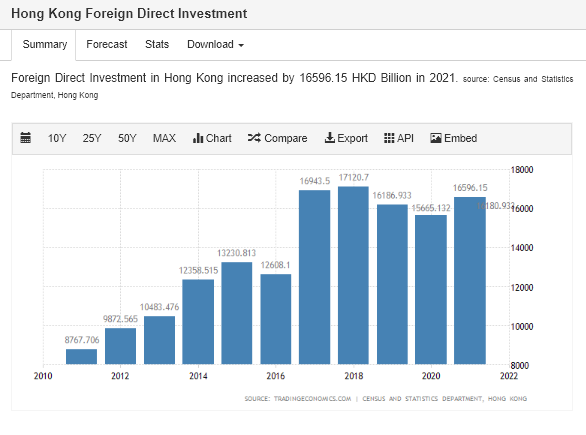
Important partnerships
I’m not aware of any significant partnerships with Hong Kong that influence economic development as I’ve seen for the other Asian Tigers (Singapore, Taiwan, and South Korea).
Excepting of course that the “partnership” with the People’s Republic of China and the 2047 deadline at which Hong Kong’s special status goes away is not something that anyone can ignore.
GDP by sector
As you can see, the GDP of Hong Kong is now very heavy on services, of which financial services make up the largest share.
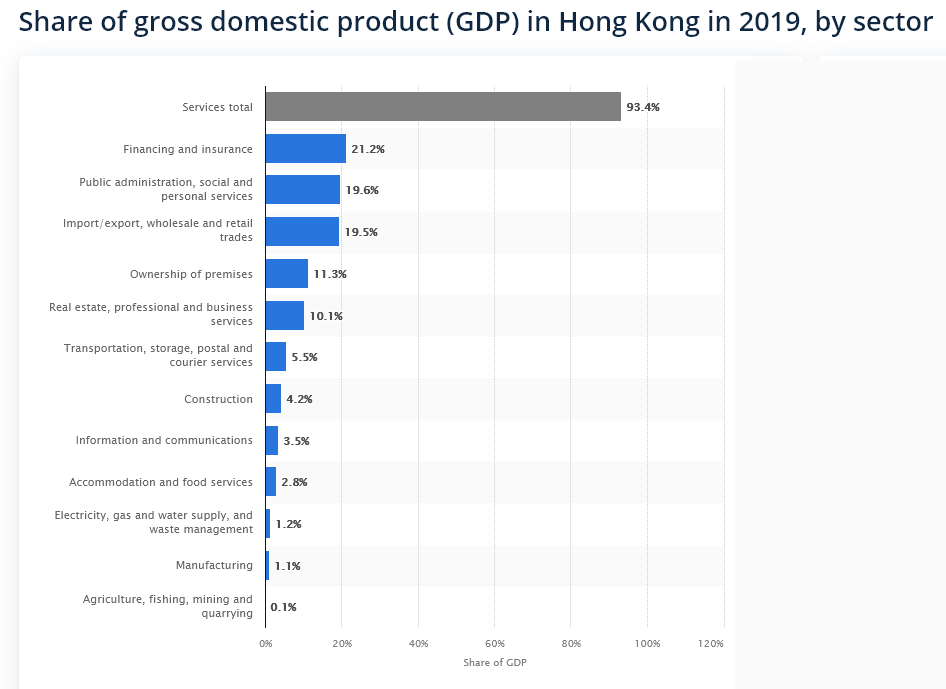
Exports by sector
How can a region whose GDP is 93% services export so much physical equipment and machinery?
I’m guessing these have to be re-exports that show up in GDP under “Import/Export, wholesale and retail trades”.
I imagine any cargo that arrives from China is imported, and when it leaves for its destination country, it’s exported.
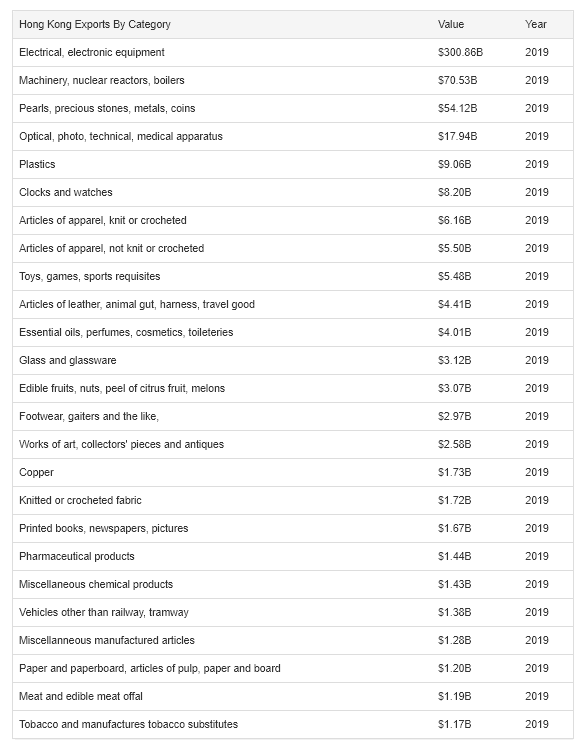
Wealth and income equality
The most widely used measure of income distribution is the Gini index. It condenses several data points into a single number from 0 (perfect equality) to 1 (perfect inequality), although it is sometimes expressed as a number between 0 and 100.
Hong Kong has a 2021 Gini index of 53.9, which ranks it as the 8th most unequal country on earth, which is not a good look considering 172 countries are being scored.
For comparison, the Gini index of the United States is 41.1 (54th most unequal) and for Canada is 33.3 (127th most unequal).
In closing
The growth of economic value in Hong Kong seems to be an outlier from the other three Asian Tigers (Singapore, Taiwan, and South Korea) in that the economic development is not directly a result of authoritarian government policies.
This is especially ironic to me, as Hong Kong today is part of one of the most authoritarian regimes on earth.
It appears that Hong Kong’s economic prosperity is a result of economic freedom for corporations, bounded by supporting government policies, and strong social services.

